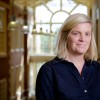This article is more than 5 years old.
Last Friday, I traveled to Elon University Preserving Scrapbooks: From Acquisition to Access put together by the North Carolina Preservation Consortium (NCPC). Led by Katie Nash, Archivist and Special Collections Librarian at Elon University, and Beth Doyle, Head of the Conservation Services Department at Duke University Libraries, this workshop was a comprehensive overview of all aspects of scrapbook acquisition, preservation, and access.
The day was broken down into the following categories: intellectual control, physical control, care and handling, and hands-on assessment. Katie started the day giving a wonderful overview of how to gain intellectual control over your holdings, specifically scrapbooks. Her discussion included collection development policies, acquisitions and accessions procedures, deeds of gift, use policies, and scrapbook cataloging. Once this foundation is established, gaining physical control over scrapbooks in a collection is the next challenge. Katie discussed various strategies from interleaving, to stabilization, to disbinding, and disassembly of scrapbooks. Elon’s practice over the years has been to disbind and disassemble scrapbooks. Their concern is more with content than artifact. Beth Doyle tended to cringe at this, but the discussion left everyone in agreement that each scrapbook is different and there is “silver bullet” way to gain physical control. The nature of scrapbooks makes them unpredictable in their physical organization as well as their contents, their users, and their usefulness as an object. Depending on the creator and the original purpose of a scrapbook, archivists and conservators can approach preservation differently.
The afternoon session was led by Beth and took a more technical turn. As a conservator rather than an archivist, Beth’s primary goal is to understand the needs of the materials and how best to preserve them. As an archivist, Katie’s concern was use, access, and content. I learned quite a bit from Beth as she highlighted specific standards when buying supplies, gave quick and easy tutorials for housing best practices, and highlighted treatment options for the myriad materials you may find in a scrapbooks (including hair, teeth, and candy!). The end of the day gave people a chance to show Beth scrapbooks they brought in for the workshop. We all had a chance to talk about best practices, but also took into consideration realistic barriers like time, budget, and space. Although it would be ideal to have a conservator like Beth to look at and recommend preservation for each of the scrapbooks in our collections, this workshop also taught us that doing our best is better than doing nothing.
As Wake Forest’s University Archives has many scrapbooks, as well as significant scrapbook holdings in our manuscript collections, I found this workshop quite helpful. As always, professional development opportunities leave me with two thoughts: “We’re not the only ones who have weird stuff” and “The answer to many archival questions is ‘it depends’.” Many thanks for the opportunity to attend this workshop!

3 Comments on ‘Rebecca at NCPC Scrapbook Workshop’
Wonderful account- I am sorry to have missed such a good workshop.
Glad it was useful. Scrapbooks are very cool and so unique!
Great! So glad you were able to attend.